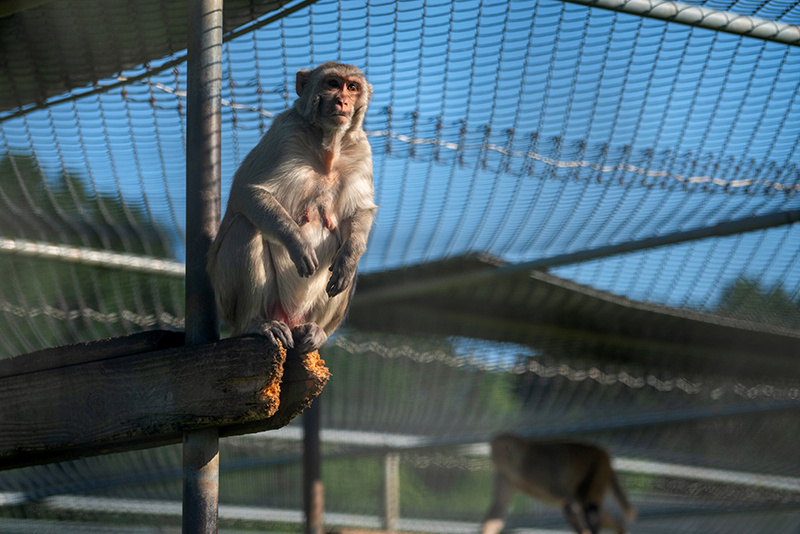Animal Research Helps People and Animals
Virtually everyone alive today has benefited from the medical advances made possible through animal research. Polio, smallpox, diphtheria, cholera and measles are no longer major threats to public health in the United States. Sophisticated diagnostic tests mean early treatment of cancer and heart disease. Advances in pharmaceuticals have given a new lease on life for tens of thousands of people with AIDS. New surgical techniques have opened the way for coronary bypasses, joint replacements and organ transplants. All of these advances have been made possible through animal research in medicine.
Biomedical research has enhanced the lives of our animal companions, too. Pets, livestock, wildlife and animals in zoos live longer, more comfortable and healthier lives as a result of animal research. Veterinarians can now treat diseases that once killed millions of animals every year. Vaccines for feline leukemia viruses, rabies, distemper and parvovirus, as well as treatments for heart worm, cancer and hip dysplasia are now available because of animal research. Animal research has also been integral to the preservation of many endangered species.
Animal Research is Necessary
While scientists have developed many valuable non-animal models that are useful in some types of medical research and can supplement work with live animals, these methods cannot mirror the complicated processes that occur in a living system. Development of any new medicine requires testing in animals to determine if it is safe and effective. Federal law mandates that tests be conducted in animals before approval can be given for clinical trials involving people.
Animal Research is Humane
Responsible scientists know that good science and good animal care go hand-in-hand and would not tolerate cruel or inhumane treatment of any laboratory animals.
The U.S. Animal Welfare Act (AWA) sets strict standards of care and research for laboratory animals. Research facilities are registered with the U.S. Department of Agriculture (USDA) which has responsibility for enforcing the mandates of the AWA. Stringent regulations on animal care are also in place for institutions receiving federal funds.
Each research facility is also required to have an Institutional Animal Care and Use Committee, which includes at least one outside member as well as a veterinarian. The Committee scrutinizes research proposals to ensure that alternatives to animal use are considered and that all animals involved receive humane care. The vast majority of research institutions in the United States, including the TNPRC, voluntarily seek accreditation from the Association for Assessment and Accreditation of Laboratory Animal Care International (AAALAC) in addition to complying with local, state and federal laws that regulate animal research. *
*Adapted from Americans for Medical Progress, www.amprogress.org
Alternatives in Animal Research: Reduction, Refinement and Replacement
Research using animals has resulted in significant advances in human and animal health. Sustained progress in the health sciences will require the continued use of animals as models of human and animal disease.
The TNPRC is committed to the humane care and use of animals and adheres to the principles of humane animal experimentation proposed by Russell and Burch in their book The Principles of Humane Experimental Technique (1959). These principles, commonly referred to as the Three R's and defined as reduction, refinement and replacement, were proposed as key strategies to provide a systematic framework to achieve the goal of humane experimental techniques.
Russell and Burch defined reduction as a means of lowering "the number of animals used to obtain information of a given amount and precision", refinement as any development leading to a "decrease in the incidence or severity of inhumane procedures applied to those animals which have to be used", and replacement as "any scientific method employing non-sentient material which may in the history of animal experimentation replace methods which use conscious living vertebrates".
Reference: Russell, W.M.S. and Burch, R.L. (1959). The Principles of Humane Experimental Technique. 239pp. London, UK: Methuen.
The mission of Tulane University is to create and communicate knowledge that enriches and sustains individuals, organizations, and communities. Scientific and biomedical investigations, which often involve animals, are a core part of the research portfolio of the university.
Tulane requires that research animals be treated in an ethically responsible way and with compassion and dignity. The university respects and accepts the moral and ethical implications of using animals in research, and it is committed to being compliant with all government regulations pertaining to animal research. It adheres to the tenets of W.M.S. Russell and R.L. Burch* that call for the refinement of experimental methods, the reduction of pain and distress experienced by test subjects, the minimization of the number of animals used in research where consistent with sound experimental design, and the replacement of animals with non-animal experimental methods wherever feasible.
While the university is diligent in pursuing alternatives, certain experiments requiring animals are vital to the advancement of knowledge that benefits both animals and humans.
The university is also committed to protecting and preserving the rights of individuals who use animals in their experiments. Tulane insists that its researchers be accorded respect and that they be able to pursue their work in an environment free from harassment, intimidation, and violence.

